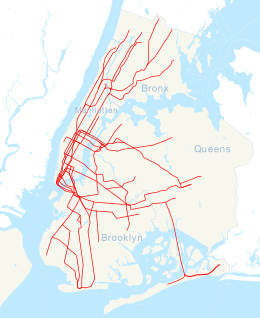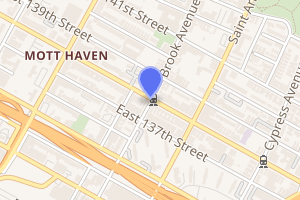Brook Avenue station
Brook Avenue is a local station on the IRT Pelham Line of the New York City Subway. It is served by the 6 train at all times and is located at Brook Avenue and East 138th Street in the Mott Haven neighborhood of the Bronx.
Brook Avenue | |||||||
|---|---|---|---|---|---|---|---|
Southbound stair | |||||||
| Station statistics | |||||||
| Address | Brook Avenue & East 138th Street Bronx, NY 10454 | ||||||
| Borough | The Bronx | ||||||
| Locale | Mott Haven | ||||||
| Coordinates | 40.80754°N 73.91932°W | ||||||
| Division | A (IRT) | ||||||
| Line | IRT Pelham Line | ||||||
| Services | 6 | ||||||
| Transit connections | |||||||
| Structure | Underground | ||||||
| Platforms | 2 side platforms | ||||||
| Tracks | 3 | ||||||
| Other information | |||||||
| Opened | January 7, 1919[1] | ||||||
| Station code | 376[2] | ||||||
| Accessible | not ADA-accessible; accessibility planned | ||||||
| Wireless service | |||||||
| Opposite-direction transfer available | No | ||||||
| Traffic | |||||||
| Passengers (2019) | 1,823,468[4] | ||||||
| Rank | 254 out of 424[4] | ||||||
| Station succession | |||||||
| Next east | Cypress Avenue: 6 | ||||||
| Next west | Third Avenue–138th Street: 6 | ||||||
| |||||||
| |||||||
| |||||||
History
This station opened on January 7, 1919 with the extension of the Pelham Line from Third Avenue–138th Street to Hunts Point Avenue by the Interborough Rapid Transit Company.[1]
In 1951, the MTA proposed building a transfer from the IRT Pelham Line to the IND Second Avenue Line at Brook Avenue, though that was never built.[5][6] Instead, both platforms were extended at either ends in the 1960s to accommodate the current standard length of an IRT train (510 feet (160 m)). The extensions are noticeable as they are narrower than the rest of the platforms, have no columns, and the trim line is blue with "BROOK AVE" in white sans serif font. The extensions result in the platforms being slightly offset.
In 1981, the MTA listed the station among the 69 most deteriorated stations in the subway system.[7] Under the 2015–2019 MTA Capital Plan, the station, along with thirty other New York City Subway stations, will undergo a complete overhaul and would be entirely closed for up to 6 months. Updates would include cellular service, Wi-Fi, charging stations, improved signage, and improved station lighting.[8][9] However, these renovations are being deferred until the 2020–2024 Capital Program due to a lack of funding.[10] In 2019, the MTA announced that this station would become ADA-accessible as part of the agency's 2020–2024 Capital Program.[11]
Station layout
| G | Street level | Exit/entrance |
| P Platform level |
Side platform | |
| Southbound local | ← | |
| Peak-direction express | ← | |
| Northbound local | | |
| Side platform | ||
This underground station has three tracks and two side platforms. The center express track is used by the weekday peak direction <6> service.[12]
Both platforms have their original Dual Contracts mosaic trim line and name tablets. "B" plaques for "Brook" alternating with plaques showing a pattern of concentric diamonds run along the trim line at regular intervals and the name tablets have "BROOK AVE." in all-caps, serif lettering. The trim line has a geometric Vickers design of brightly colored diamonds in blue and green, bordered by scarlet red and yellow bands. The tablets have a background of blue with a yellow-ochre border. Some of the tablets themselves, and sections of the trim line on both sides have been replaced in recent years with historically accurate replicas. Dark yellow i-beam columns run along the platforms at regular intervals with every other one having the standard black name plate with white lettering.
There are no crossovers or crossunders to allow free transfers between directions.
Exits
Both platforms have one same-level fare control area at the center. Each one has a turnstile bank, token booth, and two street stairs. The ones on the Pelham Bay Park-bound platform go up to either southern corners of Brook Avenue and East 138th Street while the ones on the Manhattan-bound platform go up to either northern corners.[13]
References
- "New Lines In Bronx Coming This Year: Rays of Rapid Transit to be Let Into Dark Sections in the West and North" (PDF). nytimes.com. The New York Times. January 7, 1919. Retrieved January 25, 2016.
- "Station Developers' Information". Metropolitan Transportation Authority. Retrieved June 13, 2017.
- "NYC Subway Wireless – Active Stations". Transit Wireless Wifi. Retrieved November 13, 2019.
- "Facts and Figures: Annual Subway Ridership 2014–2019". Metropolitan Transportation Authority. 2020. Retrieved May 26, 2020.
- Rapid Transit Construction Program; 1951 (New York City Board of Transportation)
- Crowell, Paul (September 14, 1951). "$500,000,000 VOTED FOR 2D AVE. SUBWAY BY ESTIMATE BOARD" (PDF). The New York Times. Retrieved January 2, 2017 – via The New York Times Archive.
- Gargan, Edward A. (June 11, 1981). "Agency Lists Its 69 Most Deteriorated Subway Stations". The New York Times. Retrieved August 13, 2016.
- "MTA Will Completely Close 30 Subway Stations For Months-Long "Revamp"". Gothamist. Archived from the original on August 1, 2016. Retrieved July 18, 2016.
- "MTAStations" (PDF). governor.ny.gov. Government of the State of New York. Retrieved July 18, 2016.
- Berger, Paul (April 3, 2018). "New York Subway Cuts Back Plans to Renovate Stations". Wall Street Journal. ISSN 0099-9660. Retrieved April 3, 2018.
- "Press Release - MTA Headquarters - MTA Announces 20 Additional Subway Stations to Receive Accessibility Improvements Under Proposed 2020-2024 Capital Plan". MTA. December 19, 2019. Retrieved December 25, 2019.
- Lynch, Andrew (2020). "New York City Subway Track Map" (PDF). vanshnookenraggen.com. Retrieved February 6, 2020.
- "Brook Avenue Neighborhood Map" (PDF). new.mta.info. Metropolitan Transportation Authority. April 2018. Retrieved February 28, 2019.
External links
| Wikimedia Commons has media related to Brook Avenue (IRT Pelham Line). |
- nycsubway.org – IRT Pelham Line: Brook Avenue
- Station Reporter — 6 train
- The Subway Nut — Brook Avenue Pictures
- Brook Avenue entrance from Google Maps Street View
- Platforms from Google Maps Street View



